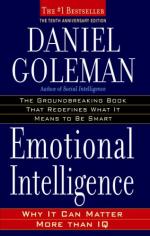
|
| Name: _________________________ | Period: ___________________ |
This test consists of 5 short answer questions, 10 short essay questions, and 1 (of 3) essay topics.
Short Answer Questions
1. According to the author in Part Three: Chapter 10, “Managing with Heart,” the days of the bully manager are over in favor of building what in the workplace?
2. Emotional intelligence can be called what, according to the author in Part Five: Chapter 16, “Schooling the Emotions”?
3. Dr. John Gottman and a colleague identified the three most toxic parenting styles. Which is the first discussed in Part Four: Chapter 12, “The Family Crucible”?
4. T. Berry Brazelton found through research that a child's readiness for learning is based on seven key factors. Which is the first of these?
5. Psychologist John Lochman designed a program to retrain aggressive boys in what?
Short Essay Questions
1. What is the author’s position in teaching “character”? What is his conclusion in this regard at the end of the book?
2. What program of John Lochman’s is decribed in Part Five: Chapter 15, “The Cost of Emotional Illiteracy”? What were the results of the program?
3. Why four temperamental types are described in Part Four: Chapter 14, “Temperament Is Not Destiny”? Who identified these types?
4. Why do parents have the greatest influence in shaping a child’s brain, according to the author in Part Four: Chapter 14, “Temperament Is Not Destiny”?
5. Why is “bullying” an inadequate managerial technique, according to the author in Part Three: Chapter 10, “Managing with Heart”? What does good management mean?
6. What does the author state in regard to personal prejudice in the workplace in Part Three: Chapter 10, “Managing with Heart”?
7. What does the author state regarding “age-appropriate learning” in Part Five: Chapter 16, “Schooling the Emotions”?
8. What discovery did Dr. David Spiegel make regarding emotions and the body?
9. What study did Hilda Bruch develop in the 1960s? What discoveries did she make?
10. What advice does Harry Levinson give to managers on coaching employees in Part Three: Chapter 10, “Managing with Heart”?
Essay Topics
Write an essay for ONE of the following topics:
Essay Topic 1
Analyze and discuss marriage and divorce rates in the past 100 years. What causes are given in the text for the growth in divorce rates? Are there other conditions that apply to this change? How have views on the institution of marriage changed? How have these differences in views affected divorce rates?
Essay Topic 2
Discuss the work of Mihaly Csikszentmihalyi and the concept of “flow.” How is flow defined? How do people in the state of flow perceive time and obstacles? How does one attain this state?
Essay Topic 3
Describe and discuss work of Robert Ader. What impact did Ader’s discovery about the immune system have on the scientific community? What did the resulting experiments show? How can one learn skills to manipulate emotion and health?
|
This section contains 854 words (approx. 3 pages at 300 words per page) |

|




